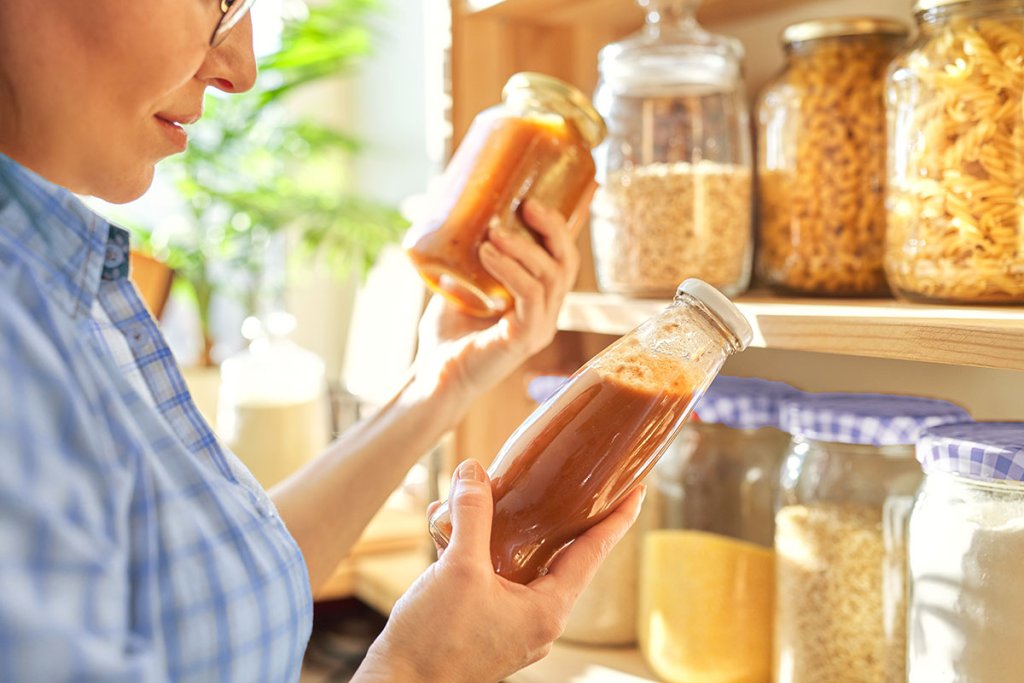Life is busy, but eating healthy doesn’t have to be an afterthought. Stocking your pantry with the right nutritious — and delicious — foods can give you the foundation to cook wholesome meals for yourself and your family.
Why you should stock your pantry with healthy food
Having a thoughtfully stocked pantry with healthy and delicious food options is key to maintaining a balanced diet full of essential nutrients and vitamins your body needs to stay energized and functioning throughout the day. Fortunately, eating good-for-you food regularly doesn’t have to be difficult or expensive. Plus, having healthy ingredients on hand makes it easier to prepare nutritionally-balanced meals on the fly.
“Daily living is just all about convenience,” says dietitian Sinan Ozyemisci, MS, RDN. “We always find what’s easy, what’s convenient, what’s quick for me to grab, but it’s also going to meet some of the goals for my nutrition needs.”
He adds: “It’s also important because it eliminates the need for making stops somewhere else to get food. So, one, you’re saving time. Two, you’re saving money.”
How can I make healthy eating easier?
It’s all about creating a routine and establishing anchor behaviors. “If you have this routine of waking up, putting together a bag of trail mix with what you have in your own pantry, and then taking it to work with you, and if you do that every single morning, by week two, that’s just going to become a behavior that you don’t even think twice about,” says Sinan.
The 3 Fs
When it comes to living a healthier lifestyle, Sinan recommends you consider the three Fs: food, fitness, and frugality. “[Do the foods] align with our fitness goals? Are they great sources of energy — great sources of fuel for us? And are they cost efficient? Are they something that’s going to last in there for a while? We’re not going to finally make our way to eating it and then realize that it’s gone bad and we have to throw it out and it’s just a waste of time.”
Where do I start?
One of the best ways to make sure your pantry is stocked with healthy food choices is by planning ahead. Make a grocery list of items you need and stick to it when shopping. You can also try online grocery delivery services, which are convenient and limit the amount of unhealthy impulse buys.
Start with the basics and expand your pantry as you expand your cooking skill set. Over time, you’ll find it easier to make meals from scratch using what you have on hand.
“It takes time to accumulate what is in that pantry,” says Sinan. “It’s similar to a whiskey enthusiast collection. You don’t just start with going to a liquor store and buying 50 bottles all at once, and then be like, ‘Okay, I’m done’. I don’t think you need to get everything stocked all at the same time. The perfect collection builds out over time.”
Eventually, you’ll recognize what your household eats most of, and it will become a natural habit to purchase more of it, while avoiding buying things you know you won’t end up eating.
Which food staples should I stock up on?
When thinking about what to stock in your pantry, opt for ingredients that are nutrient-dense, low in added sugars and sodium, and high in fiber. These include items like whole grains, legumes, nuts, seeds, nut butters, dried fruits, and vegetables. You can also stock up on canned foods like beans, tuna, salmon, and chicken, which last for a long time and help avoid wasteful spending.
Let’s break down some of the best foods to reach for in the grocery store.
Canned goods
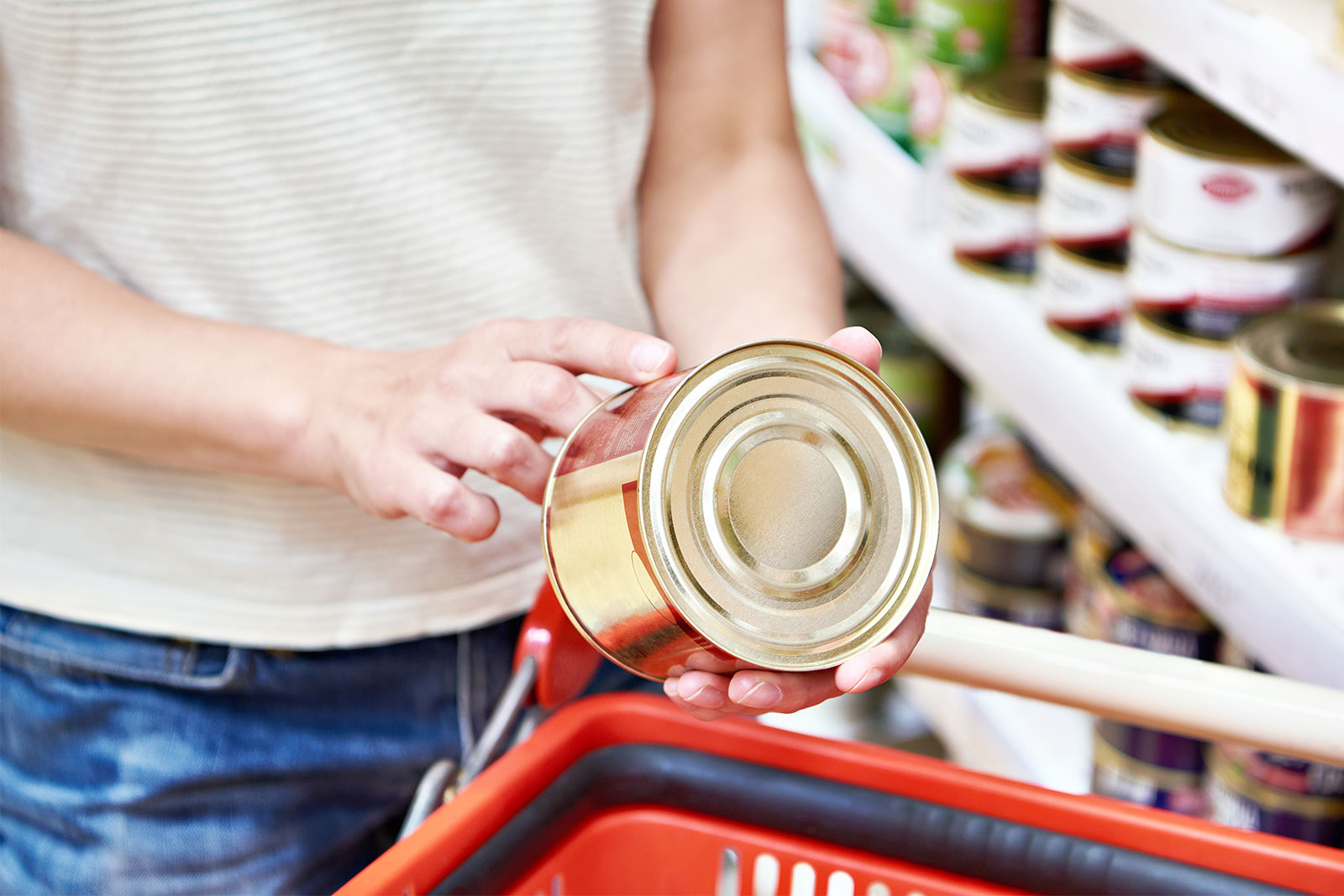
Aside from being cost-efficient and having a long shelf life (aka less likely to be wasted), canned foods can pack a punch when it comes to nutrition.
“Of the five or 10 main ingredients for me that I always have in my pantry, I think canned beans are [at the top]”, says Sinan. “Canned beans or canned chickpeas are a great protein source for our vegan and vegetarian population — as well as the meat consumers.”
Your pantry should also include a variety of fruits and vegetables. Canned options can be just as nutritious as fresh produce, and they’ll last longer.
Canned chicken and canned salmon or tuna — which are great sources of omega-3 fatty acids — are also a go-to for Sinan. “They’re very easy to make into a great recipe. Coming out of the can, it might throw people off, but with the addition of just a couple of ingredients, it goes a much longer way than a lot of us expect.”
Summary
Look for these nutrition-packed canned items next time you’re in the grocery store:
- Chickpeas
- Navy beans
- Black beans
- Pinto beans
- Salmon
- Chicken
- Vegetables
Grains and pasta
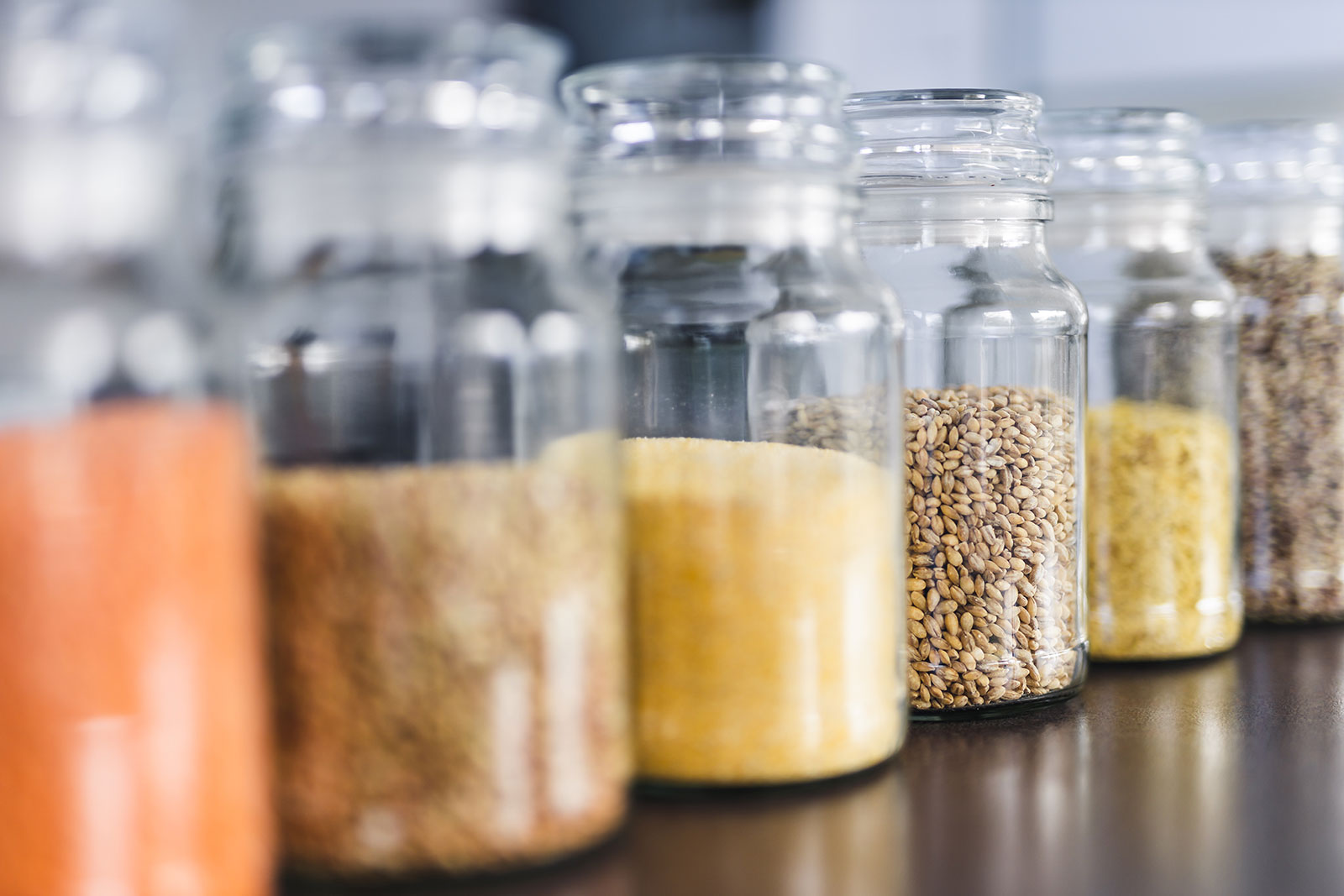
Whole grains like oats, brown rice, and whole wheat pasta, are a great source of fiber and can help keep you fuller longer. They’ve been shown to help control cholesterol levels and blood pressure, and they can help lower the risk of diabetes, heart disease, and other conditions. Plus, they’re packed with complex carbohydrates that give you the energy you need for a busy day — especially one with a workout.
Take quinoa, for example. The whole grain continues to grow in popularity as a superfood thanks to its high nutrient and lower calorie count — not to mention it’s extremely versatile in the kitchen, either as an ingredient in a main entree or as a simple, healthy side dish.
“I know it scares a lot of people at first just because of the texture and the appearance, but it’s actually so much easier to cook than rice,” says Sinan. “And it’s a great source of a lot of micronutrients, fiber, and protein. So quinoa — dry quinoa is always in my pantry. I boil it plain … and I love having it ready in the fridge.”
Oatmeal is another favorite for Sinan. “It had a bad reputation in terms of it being called ‘bloatmeal’, but when we really think about the simplicity of it, it’s a very clean source of carbohydrates. So I would say it’s definitely up there for me in terms of pantry staples.”
Summary
Whole grains are a fantastic source of fiber, vitamins, minerals, and other nutrients. Healthy grains include:
- Brown and red rice
- Quinoa
- Barley
- Oatmeal
- Whole-grain bread and pasta
- Whole-grain breakfast cereals
- Farro
Spices and herbs
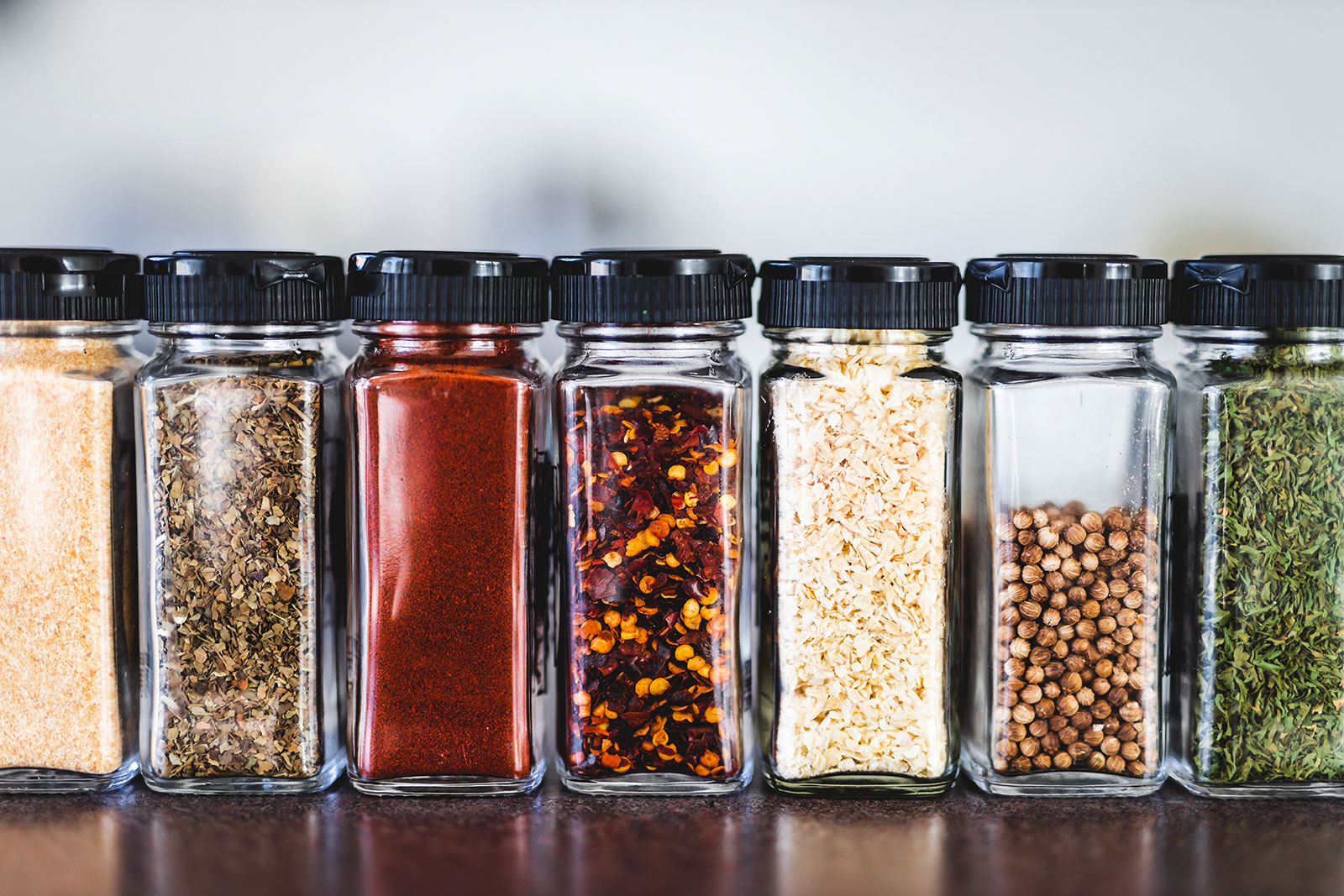
Sometimes, eating healthy — and enjoying it — comes down to flavor. “Spices, herbs, and condiments are hands down three of the most valuable tools for ensuring consistency with healthy eating,” says Sinan. “How about salsa? Or no sugar-added pasta sauce?” Mustard is also an excellent choice — it’s full of essential vitamins and minerals, and it’s fat-free.
Adding spices to recipes can reduce the amount of salt, sugar, and unhealthy fats that are often used for flavor. This means you can reduce your risk of developing chronic health conditions like diabetes, heart disease, and high blood pressure without sacrificing flavor. Plus, herbs and spices contain antioxidants, which help fight inflammation.
With just a few shakes or dashes of your favorite spices, you can season all sorts of meals while also adding health benefits!
Spice it up!
There are lots of ways to level up some of your favorite healthy foods with spices, condiments and herbs:
- Hot sauce on egg whites
- Sugar-free BBQ sauce mixed with canned chicken
- Fresh mint on fruit
- Tajín® on mango or pineapple
- Salt on cucumber and tomatoes
- Cinnamon on oatmeal or apple slices
Baking ingredients, oils, and vinegars
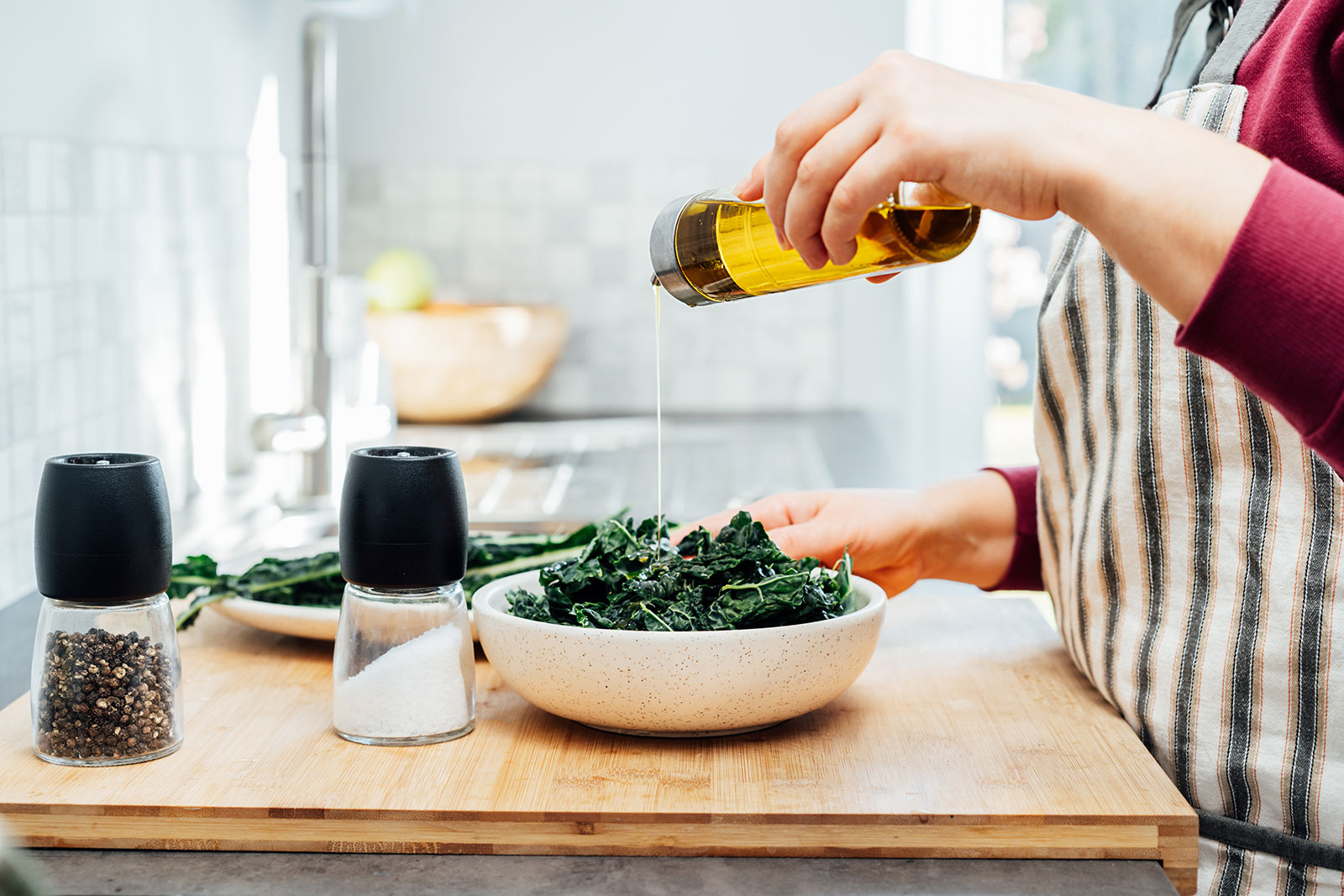
When it comes to baking, natural sweeteners such as honey and maple syrup are great substitutes for refined sugar. Whole-grain flours like spelt and oat are healthier alternatives to white flour, and can even provide a more interesting flavor. Other nutritious baking ingredients include chia seeds, almond meal, coconut oil, and dried fruit.
“We can’t forget about cooking oils,” says Sinan. “Olive oil especially is a common pantry ingredient for me. You can always have it on hand and there’s a low chance of it going bad.”
“I think apple cider vinegar is actually one of the most versatile ingredients that I have ever cooked with. [You can] put it on your salad to make a dressing. I’ve had people add apple cider vinegar to sparkling waters to make more of a kombucha-flavored drink. If you’re stir-frying vegetables, at the last minute you splash a little bit of apple cider vinegar on it to give it that tang, give it that crisp on the outside. Again, a really good ingredient that can stretch a long way.”
Summary
Reach for cooking and baking staples that have many uses and can last for a long time, including:
- Honey
- Maple syrup
- Whole-grain flour
- Chia seeds
- Sesame seeds
- Nut butter
- Dried fruit
- Coconut oil
- Olive oil
- Canola or vegetable oil
- Apple cider vinegar
Dried foods, nuts, and seeds
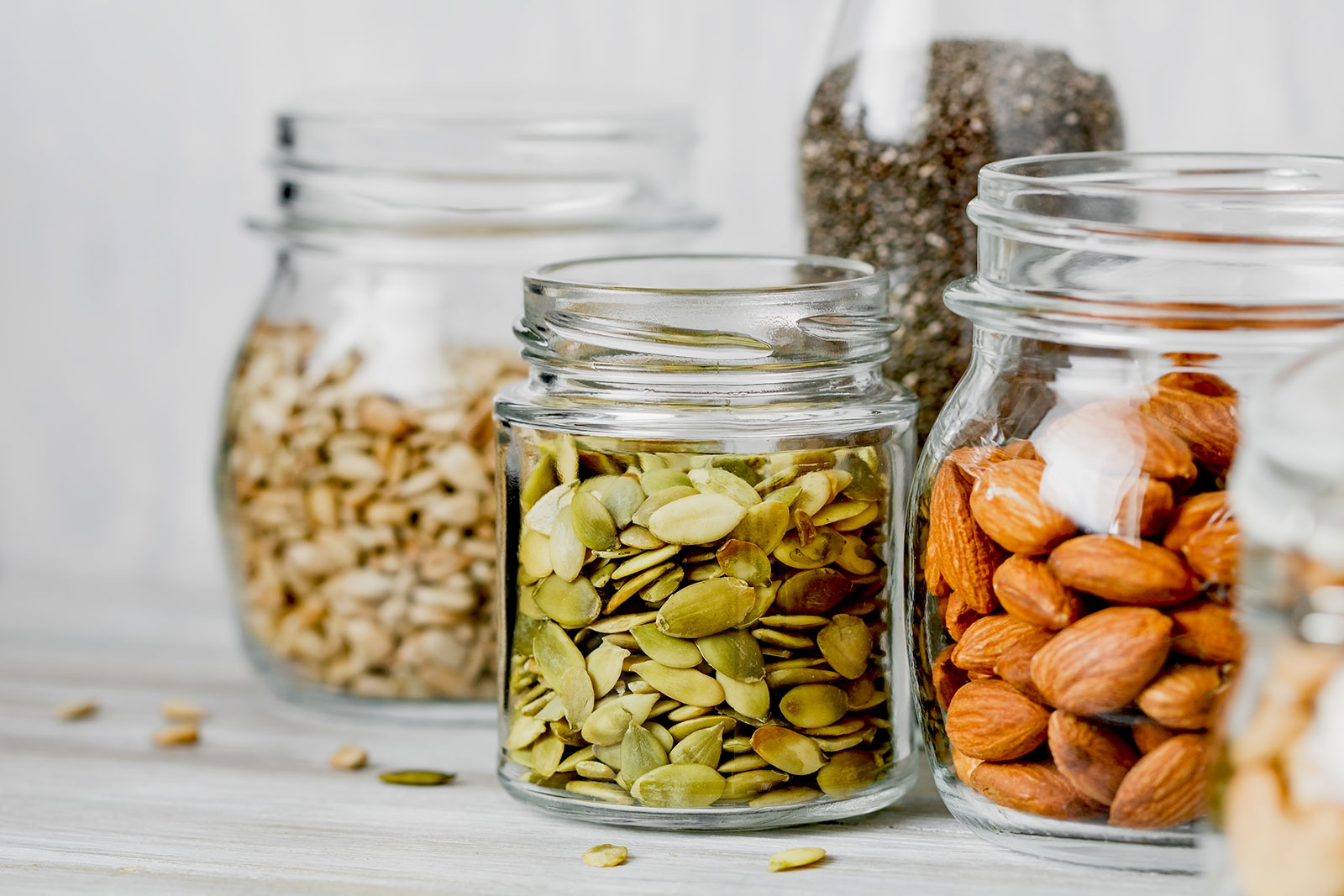
For those who love snacking (so like, everyone) nuts, seeds, and dried fruit are essential. Not only do they offer quick convenience, but they’re also packed with essential minerals and vitamins.
Dried fruits such as apricots and raisins are great sources of fiber and iron, while nuts like almonds and pistachios dish out the healthy fats. All these dried superfoods can be stored in airtight containers for a long time, making them ideal pantry staples.
“No sugar-added dried fruit, or just raw nuts and seeds — they’re controllable in terms of portion size that we can take on the go, and we’re able to meet some of those polyunsaturated fatty acids and certain micronutrient needs as well,” says Sinan.
Summary
Keep your pantry stocked with nutrient-filled snacks:
- Dried fruit
- Almonds
- Pistachios
- Walnuts
- Cashews
- Pine nuts
- Sunflower seeds
- Pumpkin seeds
Refrigerator staples
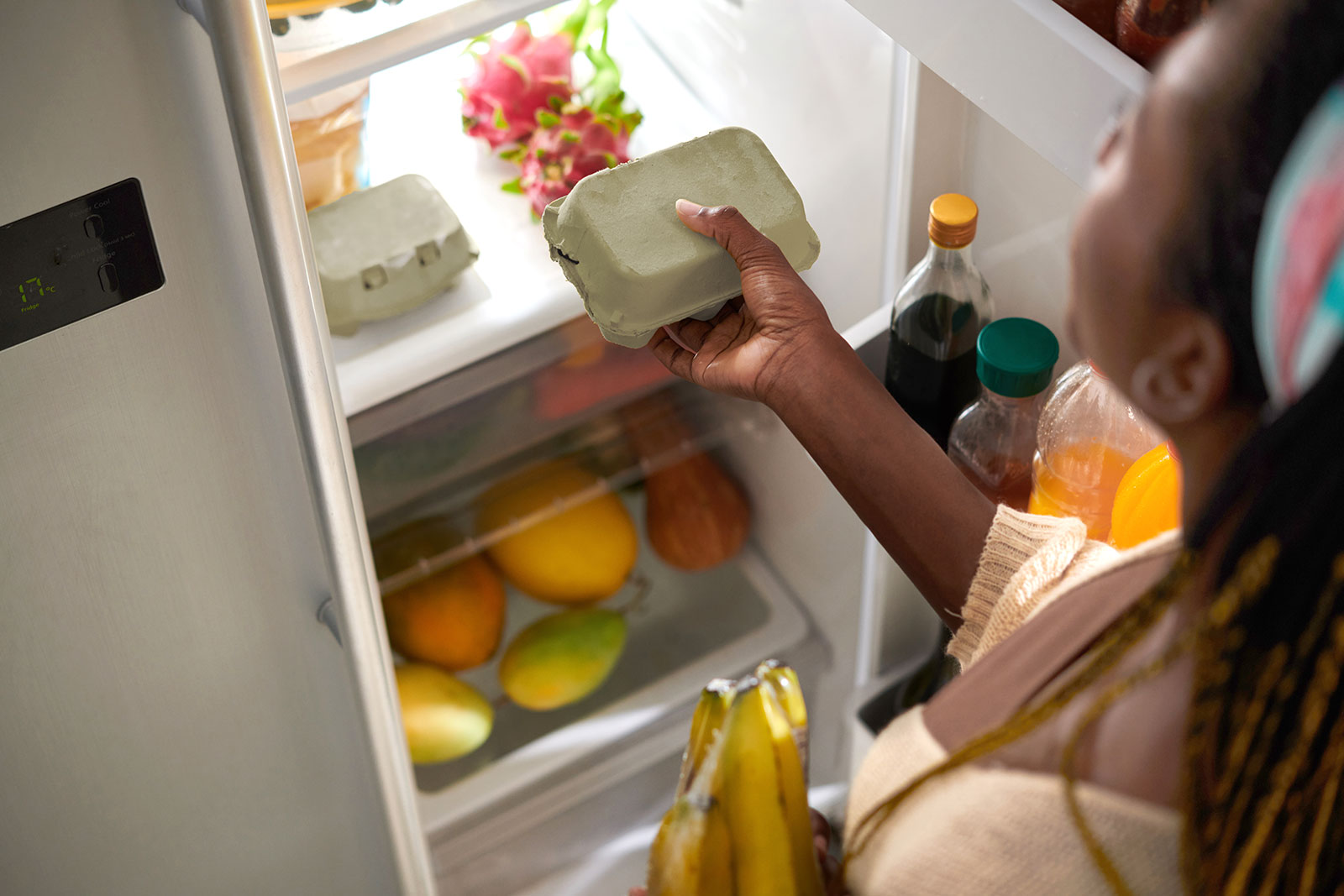
Adding nutritious volume to any meal is going to help set you up for success when it comes to healthy eating, so having greens like spinach, arugula, or lettuce handy in the fridge is a great idea. And while they won’t last as long as some other pantry staples, you can extend their shelf life by tossing them in the freezer to use for smoothies later on.
For protein sources, Sinan recommends eggs. “Protein is definitely the one that we struggle with the most in terms of being able to meet goals or targets. So secret ingredients like egg whites in certain recipes are good.”
Another underused ingredient? “Greek yogurt,” says Sinan. “Plain yogurt gets used in so many savory dishes and toppings and sauces, that there’s just a huge spectrum of opportunities to use that. And before we even realize, we’re like, ‘Whoa, I didn’t realize that was 15 extra grams of protein on top of my dish.’”
Sinan’s pantry staple buffalo dip:
- Canned chicken + two tablespoons of Greek plain yogurt + a ton of hot sauce!
Food is meant to be enjoyed. Eating healthy gives you an opportunity to try something new, get creative in the kitchen, save time and money, and improve your overall health. We understand that there’s only so much time in a day, so start small and pick one healthy ingredient from your pantry as a starting point for each dish. Taking that first step will ultimately pay off in the long run! So don’t obsess about perfection — just make it delicious, enjoyable, and nutritious.
Ready to put some of those pantry staples to use? Make it fun for the family with DIY Grain Bowls, or get your prep on with these 6 Healthy Grab-and-Go Breakfasts.

Sinan Ozyemisci
As a registered dietitian who has completed two master’s degrees in nutrition, Sinan loves and lives by the philosophy of continued education. Having spent the first 10 years of his life overseas in Turkey, Sinan quickly gained exposure to the importance of farm-to-table on his grandmother’s farm. Combining that with competitive athletics throughout his entire life, he always knew nutrition was his forever dream. And with his role as a Registered Dietitian at Stronger U Nutrition, Sinan can make that dream a reality by changing lives and improving the health and well-being of those around us.
